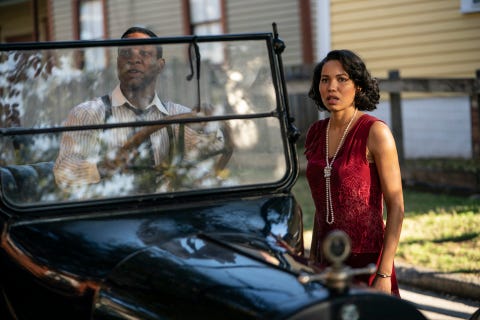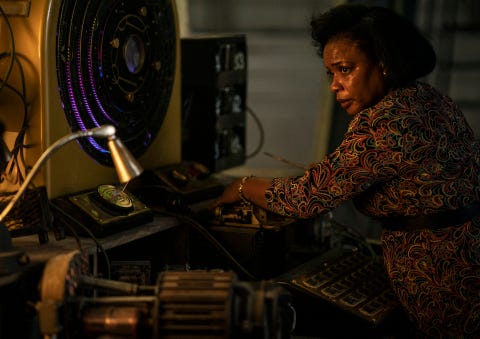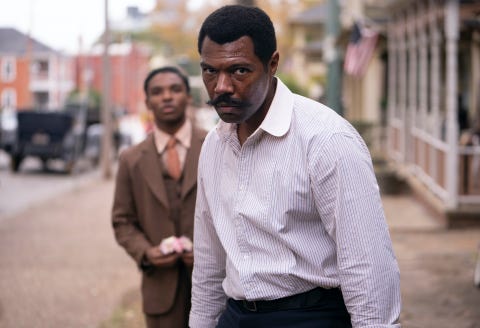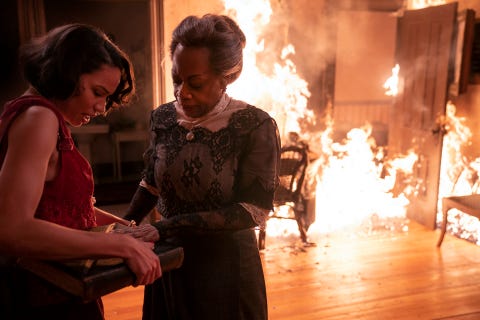Welcome to another week of Scaredy-Cat recaps, where I, a habitually terrified person, review what is and is not nightmare fuel on HBO's horror allegory Lovecraft Country.
From the outset, it's
been tempting to compare and contrast Lovecraft Country and last year's Emmy-winning limited series Watchmen. Both HBO productions create an alternate timeline of the United States to investigate Black history; both seek to trouble and expand existing genres (in the case of Watchmen, the superhero mythos; in Lovecraft Country, horror); both share a common Big Bad: white supremacy. But whomst among us does not share that Big Bad? I've resisted the urge to compare because the series have wholly different projects and approaches; the pop culture landscape is wide enough to accommodate two series with similar methods for prodding the gaping holes in history and representation. But when it became clear that Lovecraft Country, like Watchmen, was going to root its story in the aftershocks of the 1921 white supremacist massacre of Black Wall Street in Tulsa, Oklahoma, it seemed foolhardy not to look at the series side-by-side.
It's interesting, for instance, that Watchmen chose to begin its run with the massacre, situating it as the site of a superhero origin story, like Kal-El fleeing Krypton. Lovecraft Country, meanwhile, sent its characters across the country (and around the multiverse) first, placing the massacre as backstory for the secondary older characters George (Courtney B. Vance) and Montrose (Michael K. Williams). It's only now, in the penultimate episode, that we arrive in Tulsa, in search of the Book of Names which the characters discover was burned in the massacre.
For Watchmen, the massacre was an inciting incident, the violent spark that both represented the rot at the core of American society and empowered the central characters in their eventual quest to defeat it. For Lovecraft Country, Tulsa is a bruise on the bone that, when investigated, reveals a cancer that has ravaged a generational line. While both series are, rightfully, concerned with exploring the effects of generational trauma on Black Americans, I think their differing approaches to this central traumatic event speak to their world views. Perhaps this is also a feature of the genres in which they operate. Watchmen's superhero narrative necessitates a mounting conflict in which good and evil are more or less equal adversaries—Superman and Lex Luthor facing off. The horror genre, however, often pits talented mortals against the supernatural in a journey that will probably end with the mortal triumphing, but at great cost. Superhero narratives end with the heroine rising above the rubble—Angela Abar in her backyard; horror narratives often end with the heroine covered in blood and spent—Laurie Strode in a cabin.

Which is all to say, as became clear in this episode (and, to be honest, in many prior), it is in the genre DNA of Lovecraft Country to resist releasing its central characters from their trauma. This can be easy to overlook in standard horror fare—everybody wants to know what Sidney Prescott is doing; nobody asks how she's doing. But it's harder to avoid when the trauma that haunts and will continue to haunt the characters is that of white supremacist violence, a trauma that many in the viewership share and know more intimately than, say, fleeing the Ghostface Killer. For me, this gets more difficult to negotiate as the series goes on. From surveying online responses to episode 9, I see that's not the case for everyone. That's as it should be. One of the key distinctions in engaging with pop culture is determining whether something is "not good" (not usually a useful label, to be honest) or simply "not for me." Many found this episode's engagement with generational trauma in the flesh to be cathartic. But I preface the rest of this recap with the admission that the climax of this episode was deeply, violently not for me. But you came here to find out how scary it is, so let's get into it!
Spoilers for Lovecraft Country episode 9, "Rewind 1921."
How scary is WebMD?
After being cursed by Captain Lancaster (Mac Brandt) and attacked by Topsy and Bopsy (Kaelynn Harris and Bianca Brewton), Dee (Jada Harris) is comatose and physically transforming into a Topsy demon herself. Like, her hair is going from a combed-out crown to tight little pigtails of terror! Talk about side effects. A disease that will give you a new hairstyle is not for me, darling. All the adults—Ruby (Wunmi Mosaku), Leti (Jurnee Smollett), Tic (Jonathan Majors), and Montrose are gathered trying to figure out what to do. They keep suggesting different spells to try. Look, I know this is a unique situation but the last thing I want in my personal physiological space is healthcare by committee. These folks are over here chiming in like commenters on a message board. "Have you tried giving her apple cider vinegar???? Worked for my aunt!!!!!" Folks out here acting like Dr. House doing rounds.
Eventually, they call in Christina (Abbey Lee) who can turn back the clock on the spell but not break it, giving Dee only 24 hours before she gets turned again. What is the co-pay for this treatment? Christina needs the blood of Dee's closest relative and that's going to have to be Montrose until guess who rolls in the door, looking invigorated and suspicious (my two signature emotions): Hippolyta (Aunjanue Ellis)! Christina performs the ceremony and buys Dee a day. However, if Christina had the Book of Names, she says, she could break the spell. So, Hippolyta packs up the car and decides to go back to the observatory to send Tic, Montrose, and Leti through the Multiverse-a-tron 3000. They have to retrieve the Book of Names from Tic's mother's house in 1921 before the house and book are burned in the Tulsa massacre. Verdict: If you thought doing a doctors appointment by video conference was scary, you'll hate doing one by time travel. Scary!

How scary is therapy?
Consider for a second the different paths of Hippolyta and Montrose, both grieving George and both products of an oppressive society. Montrose spends most of this episode heavily drinking, which we see in 1921 Tulsa is a trait picked up from his father. Montrose's father also violently beat him for transgressions ranging from putting on his older brother's prom jacket to wearing a corsage in his hair. Montrose would later go on to beat Tic just as savagely in a deeply misguided attempt to prepare his son for a cruel world. Is it wise to send Montrose back to the site of his deepest trauma, a night of unmitigated violence in which friends and neighbors were killed in front of him? Um, no. I do not think so. Montrose needs a queer-affirming Black therapist and some time to heal. That's my professional WebMD opinion.
Whereas Hippolyta tells the crew she's spent 200 years on Earth-504 and has used that time to name herself and gain access to infinite possibilities and infinite wisdom. Hippolyta has done the therapy work. Hippolyta has taken the time to grow and has internalized the guidance of her therapist: Space Grace Jones Robot, MPH. This situates Hippolyta to put her body into service as the literal motherboard for the observatory when she fires up the Multiverse-a-tron 3000. She is ready inside and so she can act outside. Montrose is not in the same place, and literally revisiting the source of his trauma has a deeply triggering effect on him, one that prompts him to abandon the pursuit of the book and flee to the town square to witness an interaction between his young self (Gerard Mikell) and a close friend for whom he had deep affection named Thomas (Khamary Rose).

Like a horror-house Back to the Future, Montrose watches his young self cut off a friendship with Thomas because Thomas is gay, a sacrifice Montrose presents to Tic as one of many he made on the path to being Tic's father. Tic suspects Montrose is trying to keep Thomas from getting killed, as in the timeline, Thomas gets shot in front of Montrose minutes later. Montrose struggles to keep from acting, a heartbreaking choice. We all know the perils of changing the past and Tic fears that changing his father's specific timeline will erase his existence. It's called the Enchantment Under the Sea theory, by Dr. Emmett Brown. But it is brutal to watch characters resign themselves to not only watching their loved ones die violently, but in doing, knowing they are allowing an oppressive system to flourish, one which continues to curse them.
Young George (Christian Anderson) shows up just after Thomas is killed by a white supremacist mob and the boys are attacked. Montrose grows distressed, thinking that something in the timeline has changed. In his timeline, he and George were saved by a stranger wielding a baseball bat like Jackie Robinson. Tic's foot hits a bat in the alley where they've secreted themselves and he realizes that he is the stranger, in an echo of his dream from the pilot episode. It's a beautiful narrative flourish that also speaks to the crushing inevitability of the past. This was always the way it was going to be, the good and the evil. Tic saved his father in the past so that his father could become his father. From a therapeutic point of view, however, this is possibly troublesome. According to WebMD, we cannot hope that our children will solve our traumas. Verdict: Therapy can be hard but it's not scary.
How scary is the inevitable?
The only upside of time travel to the past is the ability to change it. For Black people, and oppressed peoples of all identities, though today may not be the best day, it's better than the days that came before. And this has always been true. There's the idea that tomorrow will be better, which is perhaps a placebo or perhaps a cure. TBD. But going back to the past without the ability to change it turns it into tourism, at best. At worst, torture.

Leti is tasked with going to Tic's mother's house to retrieve the Book of Names. She knows the house and everyone in it will be burned that night. Tic's mother is in the square with George, which is how she survives in the timeline. But all her other relatives will be killed. Leti gets attacked by a mob and finds herself standing inside the house, facing Tic's people, who are also the ancestors of her unborn child. Suddenly, she's enlisted in the project of helping them survive, or at least pretending to, as she looks for an opportunity to search for the Book of Names. It's heartbreaking, every single bit of it. All the days unlived, all the things unsaid, become painfully apparent to Leti as she shoves down the desire to warn these people about what awaits them in mere minutes.
In an upstairs bedroom, she searches for the book and gets caught by Hattie (the great Regina Taylor), Tic's great-grandmother. Pushed to the brink and running out of time, she reveals herself to Hattie and asks for her help. She asks Hattie, impossibly, to allow herself and her family to die so that Tic can live and Tic and Leti's baby can live. Hattie takes this better than I would take it, I'll just say that. She gives Leti the Book of Names and the words to say to open it. She says that when Leti's baby is born, his flesh will be Hattie's faith. It's a beautiful line and a sentiment that has been shared by thousands, millions of Black people through time. It isn't hard, I suppose, to believe that an ancestor would sacrifice their body or themselves so the next generation might live in a better world. The crux of the genre exercise in Lovecraft Country, however, is that the world is not better.
That's what I thought of when Leti, protected by Christina's spell, stood in the bedroom, holding Hattie's hand, as Hattie was consumed by flames. In two separate, gruesome, detailed, terrifying shots, we watch Hattie burn, her face contorting, her skin melting. It is, in a word, horrific. Perhaps this is just the genre achieving its logical end. Leti emerges with the book, and the trio return to their present. They have what they need to solve their immediate problem. But the trauma, a fire, continues to spread unabated. Verdict: agonizing.




